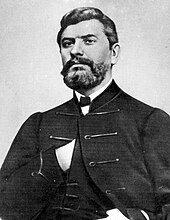
The Croatian state right (Croatian: Hrvatsko državno pravo) is a legal concept in Croatian law that represents the entirety of Croatia's rules on the establishment and functioning of government and public administrative bodies. It is also used to argue for Croatia's sovereignty, referring to the legal status of Croatia as an independent polity within the framework of various states throughout its history. Its application is pointed out as evidence of Croatia's continuous statehood since the medieval Kingdom of Croatia. The Croatian state right is listed in the preamble of the modern Constitution of Croatia as a source of the country's sovereignty.
The concept was first introduced in 1830 by Josip Kušević in the context of Croatian national revival. Kušević based the idea on development of town privileges, seeing it as a means of defense against magyarisation. The term was popularised by Janko Drašković in his 1832 Dissertation, and later developed by Ante Starčević and Eugen Kvaternik. Starčević and Kvaternik argued that all people living in Croatia are Croats and that other nations can only exist by nation-building in their own states. Implications of this definition resulted in conflict between Croatian and Serbian nationalism.